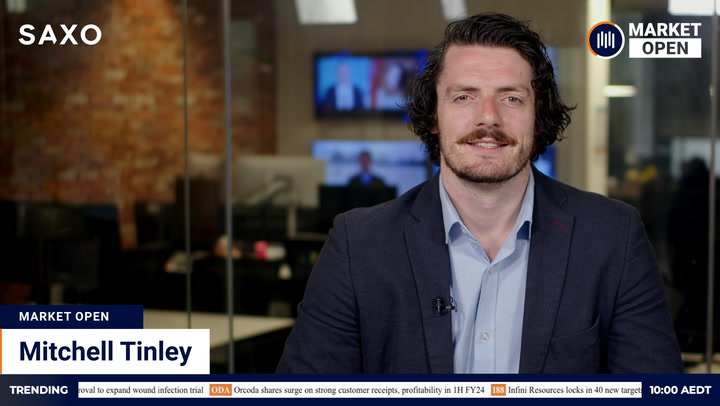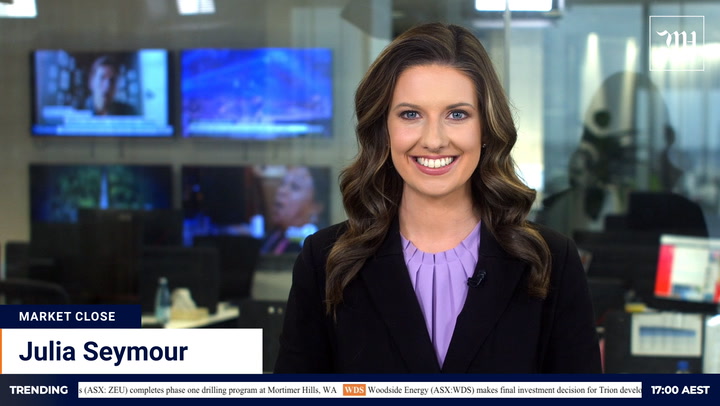Aussie stocks look set to open modestly higher ahead of interest rate decisions here and in the US.
ASX futures firmed ten points or 0.15 per cent after Wall Street pared a month of strong gains. Overnight, the major US indices fell between 0.39 and 1.03 per cent.
On commodity markets, iron ore sank to its lowest since January 2019 as China battled Covid outbreaks. Oil and most industrial metals declined. Gold logged a seventh straight losing month, its worst run since 1982.
The RBA meets this morning and will announce the new cash rate target this afternoon. The Federal Reserve commences a two-day policy meeting tonight and is scheduled to release its decision on Thursday morning, Australian time.
Wall Street
US stocks declined as traders booked profits at the end of the Dow’s best month since 1976. Rate-sensitive tech stocks led the retreat.
The Dow Jones Industrial Average eased 129 points or 0.39 per cent. The S&P 500 dropped 29 points or 0.75 per cent. The Nasdaq Composite shed 114 points or 1.03 per cent.
A huge comeback month ended on a soft note. The Dow logged a gain of 13.95 per cent for the month, its best monthly return since 1976 and its strongest October (traditionally a weak month) on record. The S&P 500 gained around 8 per cent for the month and the Nasdaq 0.39 per cent.
“Stocks are taking a breather after the big run last week,” Ryan Detrick, chief market strategist at the Carson Group, said. “Then, considering the always important Fed meeting and interest rate decision on Wednesday, a pause makes even more sense.”
Stocks accelerated through the second half of October on expectations the Fed is preparing to slow this year’s aggressive pace of interest rate hikes after another 75 basis point increase this week.
“We expect Chair Powell to hint that the [Federal Open Market Committee] will likely slow the pace to 50bp in December,” Goldman Sachs said in a note.
The October rally continued even as the market’s heavily-weighted tech giants released disappointing trading updates. Some of last week’s worst performers remained under pressure overnight.
Facebook owner Meta Platforms skidded 6.09 per cent. Microsoft and Alphabet also declined at least 1.5 per cent.
Apple dropped 1.54 per cent following speculation Covid restrictions in China could reduce iPhone production by as much as 30 per cent.
A week of potentially market-moving events continues with a series of labour market reports and trading updates from Advanced Micro Devices, Pfizer and Uber.
Australian outlook
The ASX 200 looks likely to build on yesterday’s seven-week closing high as traders exhibit few nerves ahead of this afternoon’s rates decision. A majority of economists expect the Reserve Bank to raise the cash rate target by 25 basis points to 2.85 per cent when it announces at 2.30 pm AEDT.
A larger increase is an outside possibility. A number of economists, including Westpac’s Bill Evans, believe last month’s unexpectedly “hot” inflation data merit a 50 bp increase.
Expect a sharp reaction if the RBA surprises. A larger hike would overthrow the idea that the worst of this year’s rates cycle is behind.
Whatever the decision, Governor Philip Lowe will have a chance to expand on the bank’s reasoning at 7.20 pm tonight when he addresses an RBA Board Dinner with the Hobart business community.
The market has built up a strong head of steam heading into today’s meeting. The ASX 200 rallied 1.15 per cent yesterday to its fifth gain in six sessions.
Energy was the pick of the US sectors overnight, rising 0.6 per cent. Big Tech was the heaviest drag following last week’s earnings disappointments. Financials shed 0.71 per cent.
The materials sector sank 0.87 per cent as China’s Covid woes continued to weigh on the outlook for commodity prices. However, BHP and Rio Tinto resisted the downtrend (more below). Caixin releases a measure of Chinese factory activity at 12.45 pm today.
Mild risk-off moves helped push the dollar down 0.09 per cent to 63.95 US cents.
Commodities
Australian mining giants BHP and Rio Tinto rebounded in overseas trade despite further selling in bulk metals. BHP‘s US-traded depositary receipts rallied 0.63 per cent. The miner’s UK stock gained 1.19 per cent. Rio Tinto bounced 1.02 per cent in the US and 1.14 per cent in the UK.
Iron ore dived as much as 7.1 per cent in Singapore before paring its fall. Singapore futures touched US$75 a tonne, their lowest since January 2019, before finishing at US$79.50. Prices have more than halved since April.
The most-traded January ore contract on China’s Dalian Commodity Exchange fell 4.1 per cent to 606.50 yuan (US$83.31) a tonne. Prices traded as low as 602.50 yuan, their weakest since July.
Industrial metals declined in the wake of yesterday’s soft Chinese factory data. The official China manufacturing PMI dropped into contraction territory last month, falling from 50.1 in September to 49.2.
Benchmark copper on the London Metal Exchange declined 1.4 per cent to US$7,444 a tonne. Nickel lost 0.77 per cent, lead 0.98 per cent, zinc 4.91 per cent and tin 2.71 per cent. Aluminium gained 0.63 per cent.
Oil retreated after yesterday’s Chinese data underlined the impact on economic activity of the nation’s zero-Covid policy. Media reports said authorities were expanding Covid restrictions to contain the biggest outbreak of the virus since August.
“Renewed restrictions on movement, such as the one seen in the city of Zhengzhou, plus the impact of the Communist Party Congress in Beijing, is thought to have dampened the numbers beyond initial expectations,” Harry Altham, energy analyst, EMEA & Asia for StoneX Group, said.
Brent crude settled 94 US cents or 1 per cent lower at US$94.83 a barrel. For the month, Brent gained 7.8 per cent.
Gold capped a seventh straight losing month with a modest loss, pressured by strength in the US dollar and treasury yields. Gold for December delivery settled US$4.10 or 0.3 per cent lower at US$1,640.70 an ounce.
“Gold remains a prisoner of the dollar ahead of Wednesday’s Fed decision, and then the non-farm jobs data on Friday,” Adrian Ash, director of research at BullionVault, told MarketWatch.
For the month, the yellow metal lost around 1.9 per cent. This year’s run of monthly declines is the longest since 1982, according to Dow Jones. Overnight, the NYSE Arca Gold Bugs Index dropped 1.62 per cent.






